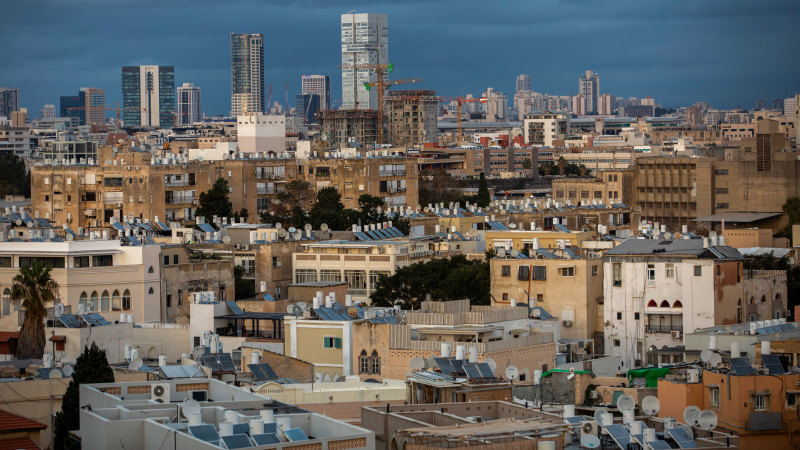Save articles for later
Add articles to your saved list and come back to them any time.
Jerusalem: Religious Israelis may soon have access to electric power that rabbis have approved for use during the weekly Sabbath, a techno-spiritual innovation that reflects changing needs of consumers and, even more, the power of ultra-Orthodox parties in Israel’s new government.
The program, unofficially dubbed “kosher electricity”, is expected to receive cabinet approval on Sunday. It would direct the national power utility to build, on a pilot basis, massive battery banks in and around ultra-Orthodox communities. These batteries would top up through the week with electricity from the public utility and dispense it during Shabbat hours, providing a workaround to rabbinical rules against plugging into the national grid from sundown on Fridays to sundown on Saturdays.
Solar panels on the roofs of residential apartment buildings in the Jaffa district of Tel Aviv, Israel.Credit: Bloomberg
The strictest kosher keepers shun commercial power during those hours because it is seen as violating strictures on working during the Sabbath or taking advantage of work by other Jews. (In Israel, most of those operating power plants and the natural gas lines that supply them over the weekend are Jewish, even if not religious.)
Many families simply go dark. A few rely on solar panels. But for others, a common workaround is a household generator operated by a non-Jew or “Shabbos goy”, typically an Arab Israeli paid for the service. Observant families still do not operate electrical switches (also considered work) but have lights, air conditioners and other appliances set to timers.
By storing energy created during non-Sabbath hours, the batteries would eliminate the need for generators and let more religious families use safer, cheaper and cleaner electricity from the grid, according to advocates. Energy and Infrastructure Minister Israel Katz, a member of the Likud party who has pushed the proposal, framed it as a way to modernise the energy sector.
A solar farm and power plant in Negev desert near the kibbutz of Ashalim in Israel.
“Accelerating the construction of energy storage facilities is essential and required for the ever-increasing demand throughout the developing cities and will increase the use of renewable energies,” he said last month, according to Jewish Business News.
Ultra-Orthodox parties have pushed for years to wire some kind of Shabbat alternative into the grid. Previous proposals, which went nowhere, included building a separate generation network operated by non-Jews or one that could be fully automated during Shabbat hours.
The ultra-Orthodox leaders demanded action on the battery technology as part of their deal to join the coalition of Prime Minister Benjamin Netanyahu, according to Israel media reports. They hailed it as a way to wean their communities from costly, polluting and occasionally exploding generators.
Yet critics have condemned the battery farms as a giveaway to the ultra-orthodox – or Haredim, as they are also known – and another perk that will benefit this growing religious minority at the expense of other ratepayers.
Opposition leaders leaped on the proposal, saying ultra-Orthodox rules shouldn’t be state policy and “kosher electricity” shouldn’t be state-funded.
In a tweet, Avigdor Liberman, who broke with Netanyahu five years ago over the rising influence of the ultra-Orthodox parties, decried the move as “more lunacy on the road to a Jewish theocracy,” according to the daily Haaretz. “For 75 years, ‘the righteous’ managed without ‘kosher electricity’.”
The proposal includes a directive that the state-owned Israel Electric Corp not raise electric bills to fund the plan. But officials within the utility and Finance Ministry have warned that the ultimate costs are likely to be borne by all utility customers. A battery farm capable of powering an ultra-Orthodox city such as Bnei Brak could cost hundreds of millions of dollars, according to one estimate.
The plan was quickly engulfed in raging debates about other ultra-Orthodox perks, including a general exemption from Israel’s military draft and substantial economic subsidies for Haredi men who opt for religious study over employment.
“It’s not enough that the Haredim receive billions and an exemption from enlistment and other benefits?,” energy consultant Amit Mor asked in an interview with Kan radio.
He hailed the battery technology as a breakthrough with many potential applications but said any community that wanted to build excess capacity should “pay for their own electricity”.
Electricity has been a challenge for Haredi communities since the days of Edison, as rabbis navigated how to take advantage of the technology without violating the sanctity of the Sabbath.
Some refrigerators include a “Shabbat setting” that keeps the light from coming on when the door is open. Elevators can be set to stop on every floor, allowing observant passengers to step on and off without touching any buttons.
In 2020, an ultra-Orthodox inspector threatened to pull the kosher certificate for a Jerusalem restaurant because of its new conduction cooktop, a type that heats up automatically when a metal pot is placed in position. Since the cafe’s cook was a Palestinian Israeli, the inspector said the system represented a violation of the rule against non-Jews lighting the ovens of kosher restaurants. The owner sought a more flexible kosher certificate.
The Washington Post
Most Viewed in World
From our partners
Source: Read Full Article


